During the month of February, the Duke Internal Medicine Residency Program celebrated Black History Month by highlighting Black leaders who served - or will serve - as chief resident and have made a huge impact on the program. Take a moment to read about these leaders below and view the full series on Twitter.
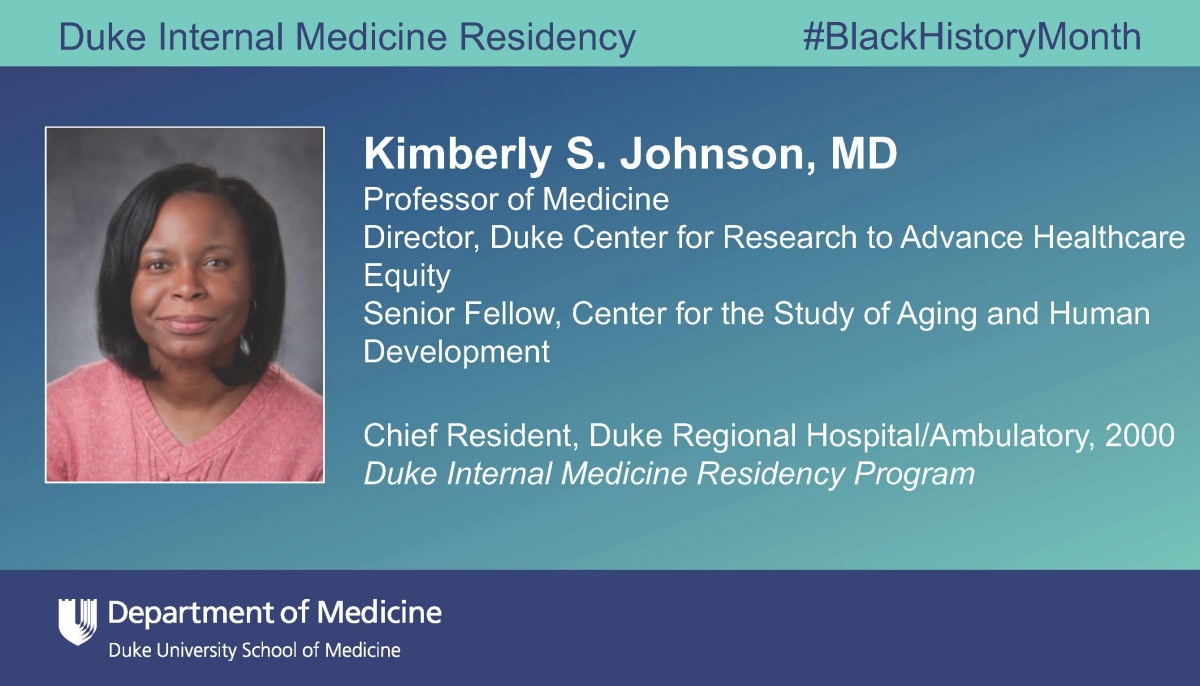
Kimberly S. Johnson, MD, served as chief resident for Ambulatory/Community Hospital Medicine in 2000.
Dr. Johnson is currently a Professor of Medicine (Division of Geriatrics) at Duke University. She attended Dillard University for undergrad and earned her MD at Johns Hopkins University. Johnson completed internal medicine residency and geriatrics fellowship at Duke. After her fellowship, Johnson began to focus her research on health disparities in hospice and palliative care
In 2017, Johnson received a Centers of Excellence grant from the National Institute on Minority Health and Health Disparities and began building Duke REACH Equity Center. Johnson also received a $5.8 million grant from the Patient-Centered Outcomes Research Institute (PCORI) to study two different types of advance care planning interventions in a multi-site study of 800 patients, half of them African American, in the Deep South.
In March 2020, Johnson’s body of work was recognized with the first Richard Payne Outstanding Achievement in Diversity, Equity and Inclusion Award, given by the American Academy of Hospice and Palliative Medicine.
“My time as a chief resident solidified my interest in a career in academic medicine (rather than community-based care for underserved populations as originally planned),” Johnson said. “My chief resident project examining disparities in end-of-life care for African Americans was the beginning of what has become my life's work.”
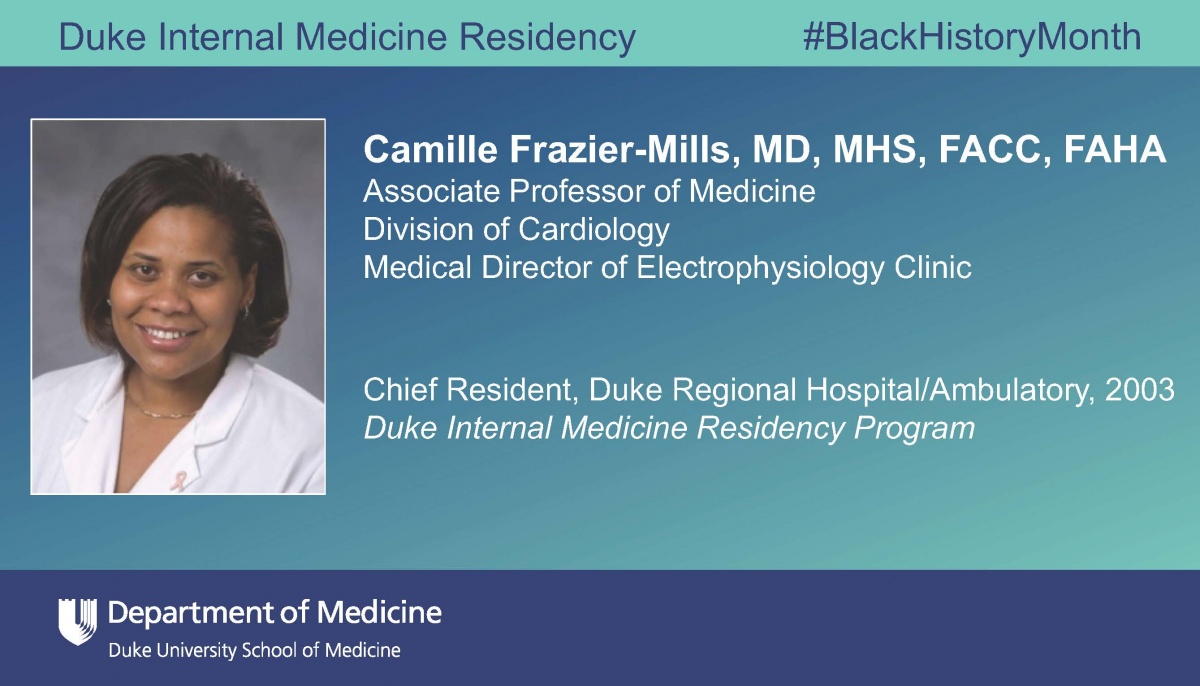
Camille Frazier-Mills, MD, MHS, FACC, FAHA, served as chief resident for Duke Regional Hospital and Ambulatory Medicine in 2003.
Dr. Frazier-Mills is currently an Associate Professor of Medicine (Division of Cardiology) at Duke University. She completed her undergraduate studies at Cornell University and earned her MD at Case Western University School of Medicine. Frazier-Mills completed internal medicine residency and cardiovascular diseases fellowship at Duke, specializing in Cardiac Electrophysiology.
Frazier-Mills directs the Electrophysiology Clinics/Device Clinic, the Syncope Dysautonomia Clinic, serves as Associate Program Director for Cardiology, and does clinical research on devices related to rhythm management. She has served as a mentor for the School of Medicine’s Visiting Clinical Scholars Program.
“Serving as a chief resident provided the foundation for my future administrative achievements. I worked with an amazing group of co-chiefs and helped foster the growth and development of the next class of residents. Helping others identify their talents and nurturing their drive and passion for compassionate, evidence-based care was an honor and a gift,” said Frazier-Mills.
Her advice for current and future residents: “Continue learning, growing and influencing. Use your talents to advance your team, community, and the world.”
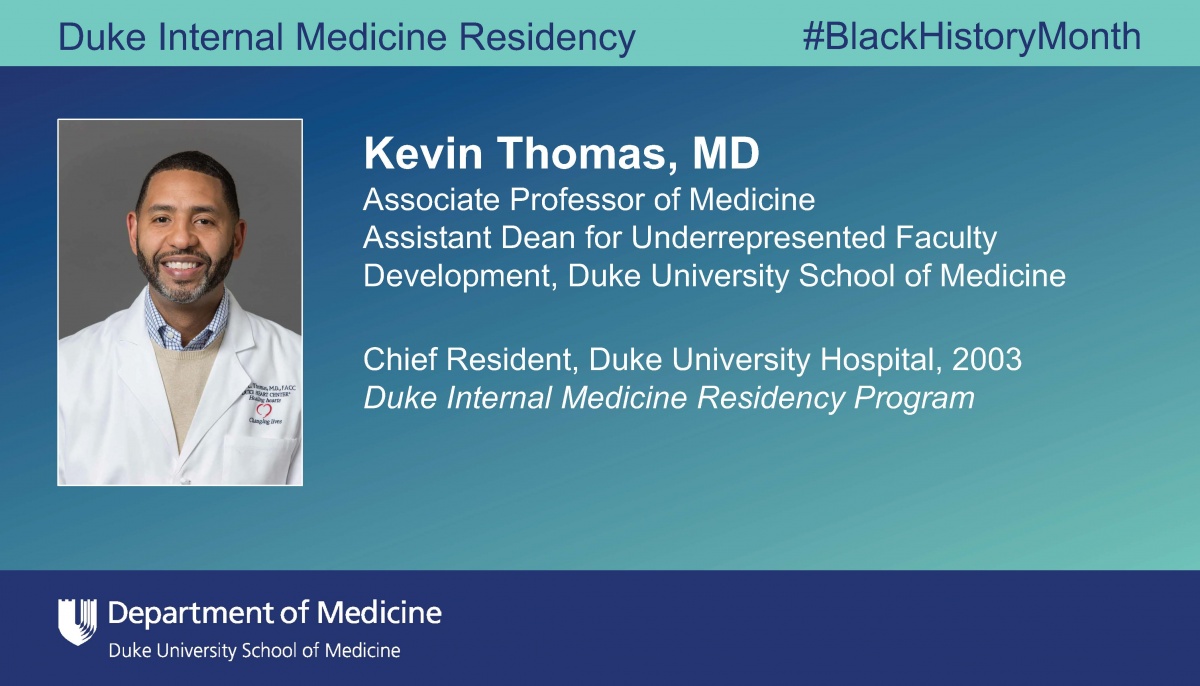
Kevin Thomas, MD, served as chief resident for Duke University Hospital Medicine in 2003.
Dr. Thomas is currently an Associate Professor of Medicine (Division of Cardiology) at Duke University. He earned his undergraduate degree at Emory University and his MD at the University of North Carolina at Chapel Hill. Thomas completed internal medicine residency and cardiovascular diseases fellowship at Duke, specializing in Cardiac Electrophysiology.
In 2016, Thomas was named Assistant Dean for Underrepresented Faculty Development in the Duke University School of Medicine. In 2017, Thomas launched the ADVANCE-UP program at Duke to provide professional development for historically underrepresented groups.
“I was honored and proud to serve as Duke chief resident,” Dr. Thomas said. “It was a memorable year in which I grew as a clinician and as a leader. Along with my co-chief resident Camile Frazier Mills, MD, we were the 3rd and 4th Black individuals to serve as chief residents at Duke. I am blessed to be a part of that history.”
Thomas offers this advice to current and future residents: “Use your influence to promote an inclusive culture and be bold in seeking change when necessary. Enjoy the year, have fun, and congratulations on your achievement.”
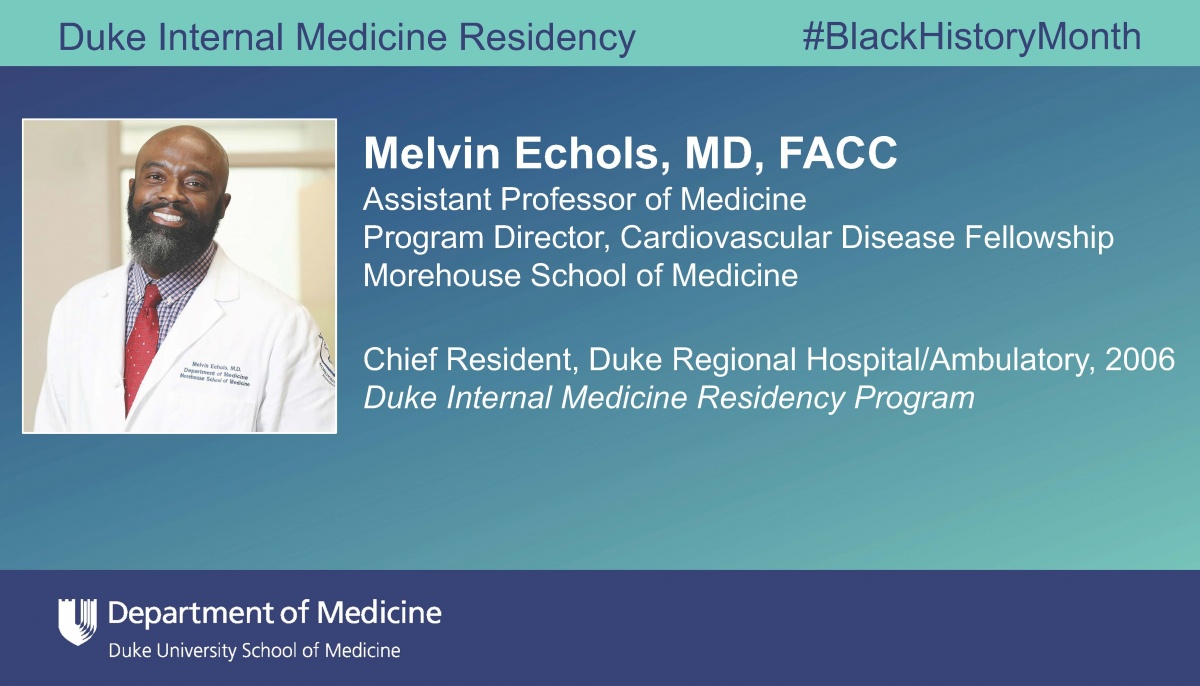
Melvin Echols, MD, FACC, served as chief resident for Ambulatory/Community Hospital Medicine in 2006 with co-chiefs Katherine Garman, MD, and Susanna Naggie, MD, MHS.
Dr. Echols is currently an Assistant Professor of Medicine and Program Director of the Cardiovascular Disease Fellowship Program at Morehouse School of Medicine, where he earned his MD. He completed internal medicine residency and cardiology fellowship at Duke. He served as the first medical director of Duke Cardiology of Lumberton and started the Community Research Cluster for Duke Cardiology in 2014.
“Becoming a chief resident was one of the best career decisions I have made thus far,” Echols said. “It is an honor to know that I am forever part of Duke’s history.”
Echols offers this advice to current and future Duke residents: “No matter where you start, it is important to remember that your circumstance does not define who you are. However, you define your circumstance. Remain encouraged and willing to learn for the rest of your life."
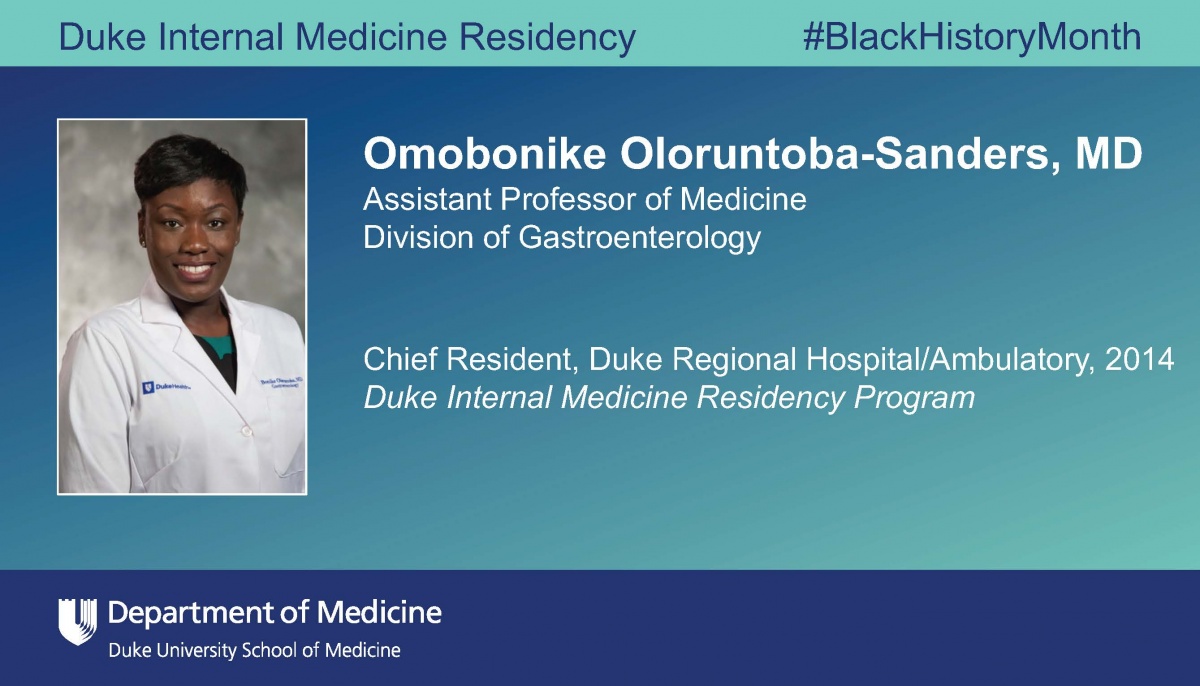
Bonike Oloruntoba-Sanders, MD, served as chief resident for Duke Regional Hospital and Ambulatory Medicine in 2014 with co-chiefs Nilesh Patel, Coral Giovacchini, and Aaron Mitchell.
Dr. Oloruntoba-Sanders is currently an Assistant Professor of Medicine (Division of Gastroenterology) at Duke University. She earned her MD at the University of Maryland School of Medicine. Oloruntoba-Sanders completed internal medicine residency, gastroenterology fellowship, and transplant hepatology fellowship at Duke.
Oloruntoba-Sanders’s clinical focus is on taking care of patients with liver disease, with a particular interest in liver cancer and liver transplantation.
“Chief year was one of the most riveting years of my career. I learned a lot about supervising and leading others, honed my teaching skills and improve my conflict resolution skills,” Oloruntoba-Sanders said. “Chief year also granted me friends (more like siblings) for life with my co-chiefs Coral, Nilesh and Aaron.”
She offers this advice for current and future residents: “Run your own race. You can’t change anything by trying to be someone else.”
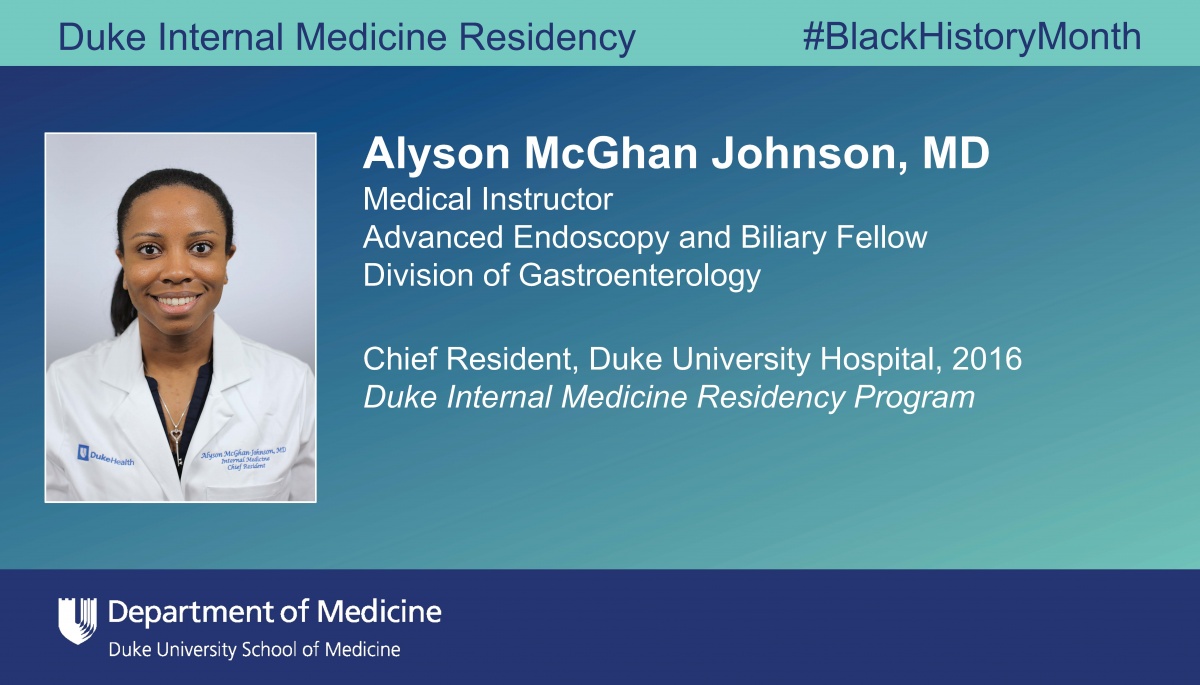
Alyson Johnson, MD, served as chief resident for Duke University Hospital in 2016.
Dr. Johnson is currently a Medical Instructor and Advanced Endoscopy and Biliary Fellow in the Division of Gastroenterology. She completed her undergraduate studies at Rutgers University and earned her MD from the Perelman School of Medicine at the University of Pennsylvania. Johnson completed her internal medicine residency training and Gastroenterology and Hepatology fellowship at Duke, where she earned the Rodger A. Liddle GI Fellow Award.
Johnson’s clinical focus is in the evaluation and management of patients with benign and malignant pancreas and biliary disorders, therapeutic endoscopy (EUS, ERCP) and endoscopic resection of complex polyps.
Her research interests include health disparities and quality improvement in advanced endoscopy and pancreaticobiliary diseases, interventional approaches to palliative care in pancreatic cancer.
“Being a chief resident provided opportunities for me to work with senior leadership throughout the Department of Medicine allowing me to network and develop mentoring relationships, enhance career development and leadership skills, and to learn and collaborate across specialties,” said Johnson.
Johnson shared this advice for current and future residents: “Enjoy the opportunity to learn not only from your attendings, but from the patients you care for, the fellows who came before you, and your co-residents. Some of the greatest lessons come from these interactions.”
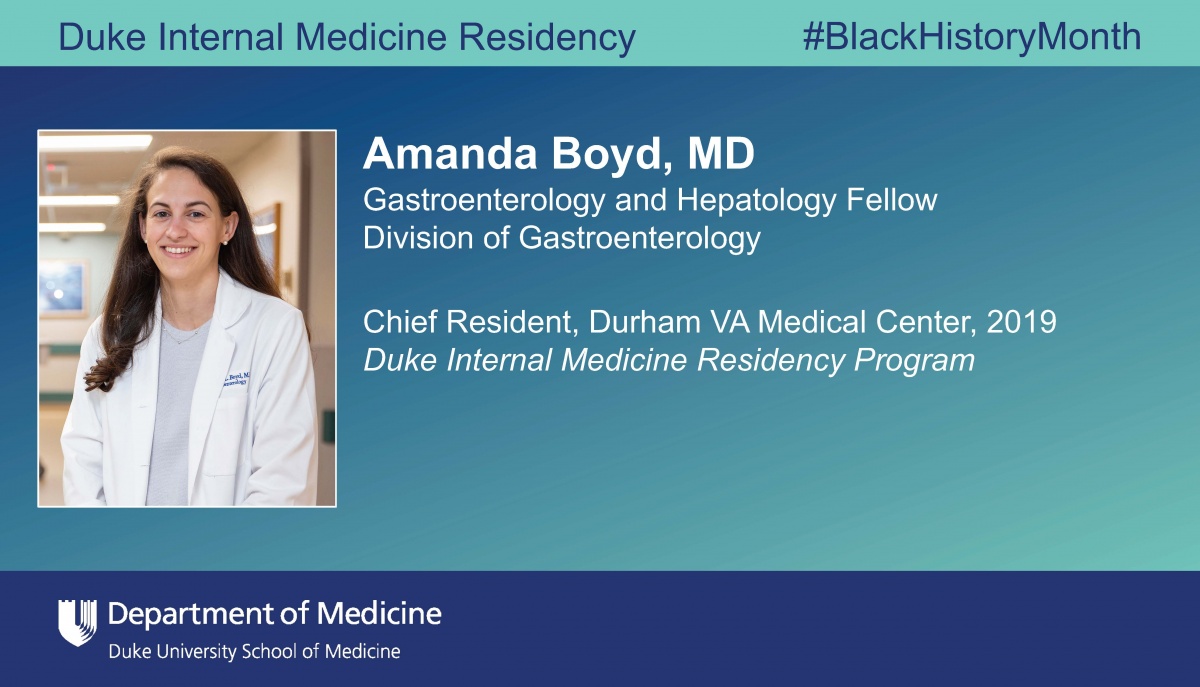
Amanda Boyd, MD, served as chief resident for the Durham VA Medical Center in 2019 with Jared Lowe, Caroline Sloan, and Lara Hayes.
Dr. Boyd is currently a Gastroenterology and Hepatology Fellow. Boyd is a first generation college student who earned her undergraduate degree from Brown University and her MD from the University of Massachusetts. She is a current Duke GI fellow and proud physician mom to a spirited 3-year-old.
“While I am still in the early stages in my career, I am confident that the skills I gained during chief year—crisis management, strategic thinking, conflict resolution, among others— have equipped me with the ability to handle most any situation, both in and out of the hospital setting,” Boyd said.
Boyd has this advice to offer future chief residents: “Be vulnerable, be present, and stick to your principles. You will be surprised at how much your opinion will be listened to, so use your positionality and words wisely to not only advocate for the residents but to promote positive change throughout the health system.”
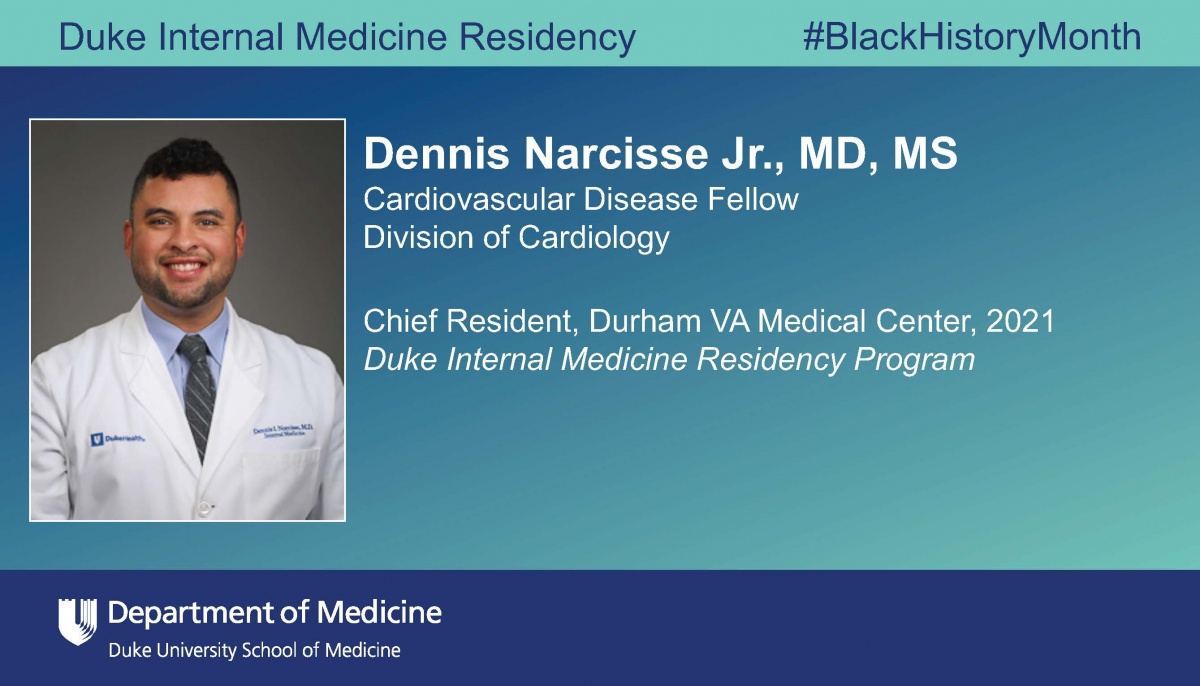
Dennis Narcisse, MD, MS, is a current Duke cardiovascular disease fellow and will serve as chief resident for the Durham VA in 2021-22 with Jessica Regan, Nancy Yang, and Mike Burt.
Dr. Narcisse completed his undergraduate degree at Mississippi State University, an MS in Biology and Medical Sciences at Mississippi College, and his MD at the University of Tennessee Health Science Center. Narcisse did his internal medicine training at Duke and went on to cardiology fellowship.
“I am looking forward to serving as a chief resident not only to grow substantially as a doctor, educator, and leader but also to build a network with a group of incredible residents and faculty. It is an honor to be a part of the history of Duke Medicine,” said Narcisse.
Narcisse offered this advice to current and future residents: “Make the most of every situation that you find yourself in. There are opportunities to grow and learn from every situation if you keep a positive attitude. Seek mentorship throughout each stage of training and never stop asking questions.”
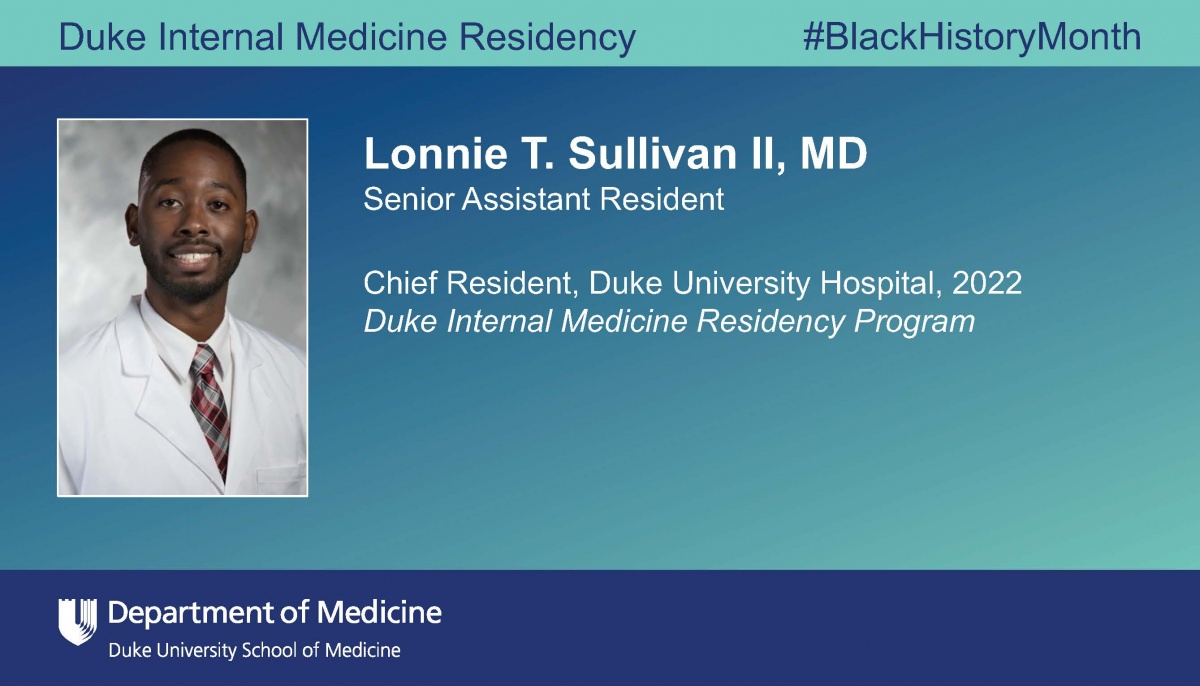
Lonnie Sullivan, MD, is a current senior assistant resident and will begin as a Duke cardiovascular disease fellow in July 2021. Dr. Sullivan will serve as chief resident for Duke University Hospital in 2022-23 with Sara Coles, MD, and Nathaniel Harris, MD, PhD.
Sullivan completed his undergraduate degree at Morehouse College and his MD at Duke University. He is completing his internal medicine residency at Duke and will go on to a cardiology fellowship. In 2020, Sullivan received the Dr. Brenda Armstrong Award for Service and an Appleseed Resident Teaching Award.
“Serving as a chief resident will foster my growth as a leader, educator and clinician. Being afforded the opportunity to give back to the Duke Internal Medicine program by serving as a future chief resident is a dream come true!” Sullivan said.
Sullivan offered this advice to current and future residents: “Remain steadfast in your pursuit of excellence and do not let any naysayers stop you from achieving what you were put on this Earth to achieve. You are meant to be here!”